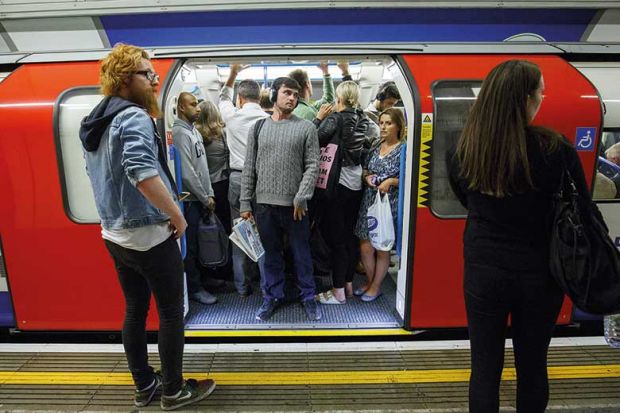UK universities should consider limiting the number of days that students are taught on campus to reduce the burden on learners who have to commute long distances, a new report says.
Institutions should also contemplate shifting the timing of lectures and seminars to ensure that students who live in their family home or further away from campus do not have to travel at peak times, according to the paper published by the Higher Education Policy Institute on 13 December.
Homeward Bound: Defining, Understanding and Aiding ‘Commuter Students’ by David Maguire, vice-chancellor of the University of Greenwich, and David Morris, the vice-chancellor’s policy officer, says that there are at least 10 universities where the proportion of students living in their parents’ home exceeds 50 per cent, and another 10 where the proportion is higher than 40 per cent. At 10 universities, more than 40 per cent of students live in their own home, as opposed to in halls. The Sutton Trust has previously estimated that around a quarter of all students are commuters.
But the Hepi report argues that UK universities still overwhelmingly cater to students who live in halls or in accommodation on the edge of campus, and cites survey evidence which suggests that institutions with high proportions of commuter students are more likely to report lower levels of student satisfaction.
Professor Maguire told Times Higher Education that universities “really need to think carefully about their policies and their support arrangement to ensure that they are adapted to meet the needs of commuter students”.
On timetabling, the report says that course organisation is often “quite haphazard, with taught sessions squeezed on to a timetable wherever possible”, meaning that students with a long distance to travel “might be more discerning than their closer peers when deciding whether a trip to their institution…is worthwhile”.
Professor Maguire said that this was a big issue for commuter students.
“The irony is that on-campus students want their classes evenly spaced out across the week, so they are not overwhelmed on any given morning or afternoon, whereas commuter students want the reverse. They want them to be blocked on to a small number of days, so they can come to uni, work flat out all day, get the work they need done and leave,” Professor Maguire said.
“Quite a few of them also have jobs, so they want their work blocked out. They also want their timetables to be really reliable, so they can organise their babysitting or commuting for every Tuesday or Thursday, whatever it is.”
The report recommends that universities should, “as much as logistically possible”, seek to make timetables “coherent and convenient” for commuter students, potentially by limiting the number of teaching days or commitments requiring peak-time travel. Students and students’ unions should be consulted on this, it says.
Professor Maguire said that the right balance would be “different for each university”.
“If your population is dominated by commuters you would make choices that way; if you are predominantly a residential university with very few commuters you would make choices that way; for those in the middle, as always, it’s a balancing act,” Professor Maguire said.
Other recommendations include providing study spaces, lockers and communal kitchens for commuter students to use, and ensuring that assessments such as the teaching excellence framework take account of the proportion of undergraduates who commute.




